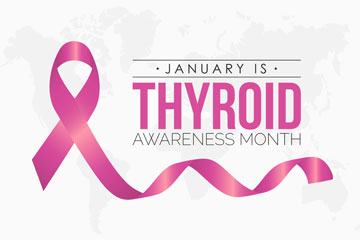Regarded as the most common endocrine disorders worldwide, about 30 million Americans have thyroid dysfunction. As part of generating awareness, January is observed “National Thyroid Awareness Month” every year – which calls attention to the various health problems related to the thyroid gland. Sponsored by the American Association of Clinical Endocrinologists, the 2023 campaign aims to generate information about thyroid diseases and encourage people to consult their physicians regarding early diagnosis, testing and treatment.

Located at base of the neck, the thyroid is a small, butterfly-shaped gland in the body that releases hormones that help regulate the body’s metabolism. The hormones released by the gland help control certain core physical functions such as sleep and weight management. When the thyroid produces too much hormone (hyperthyroidism), or not enough hormones (hypothyroidism), serious dysfunction tend to occur. If left undiagnosed and untreated, thyroid disease puts people at risk for a number of other serious conditions like cardiovascular diseases, osteoporosis, and infertility. Sponsored by the American Association of Clinical Endocrinologists, the 2023 observance help generate awareness about the health and function of the thyroid gland, its significant role in the human body and the various health problems connected to the thyroid.
According to reports from the American Thyroid Association about 1 in 10 people suffer from a thyroid disorder. It is estimated that women are particularly affected, accounting for 5 to 8 times more cases than men. It is estimated that about 60 percent of people with thyroid problems are unaware that they have this disorder. The exact causes of thyroid disorder. Based on the amount of hormones the gland secretes, there may be several symptoms such as weight gain/loss, enlarged thyroid gland, hoarse voice, dry coarse skin and hair, restlessness or tiredness, sleep disturbances and scant menstrual periods (among women).
There are different types of thyroid disorders such as hypothyroidism, hyperthyroidism, Hashimoto’s thyroiditis and thyroid nodules and thyroid cancer. In most cases, it is not possible to prevent hypothyroidism or hyperthyroidism. Though it is not possible to prevent thyroid disease, it is possible to reduce complications if the condition is diagnosed and treated at an early stage. The 2023 observance aims to raise public awareness about thyroid disease and its prevention, treatment, and cure. Here are top recommendations for better thyroid health –
- Limit the intake of “ultra-processed” foods – Reports suggest that a diet rich in ultra-processed foods have a higher risks for subclinical hyperthyroidism. Ultra-processed foods include frozen meals, hot dogs, and certain packaged food items. Reducing the intake or avoiding these foods altogether may help reduce the risks for thyroid dysfunction.
- Get enough iron in the diet – Iron deficiency can lead to a higher risk for hypothyroidism. Eat foods rich in iron like red meat, seafood, poultry and iron-fortified foods, such as grains, cereals, and infant formulas.
- Increase selenium level – Selenium plays an active role in activating the thyroid hormone, acts as an antioxidant, and protects the gland. Maintain selenium levels by increasing the intake of selenium-rich foods like chia seeds, brown rice, broccoli, cabbage, spinach, Brazil nuts, and white button mushroom.
- Take zinc supplements – Zinc supplements support efficient thyroid function and help control symptoms like fatigue, sleep disturbances and weakness. Incorporate zinc rich foods like red meat, beans, nuts, whole grains, include oyster and dairy products in your diet.
Symptoms of thyroid disorders tend to develop over the years. If you experience signs or symptoms of a thyroid problem, consider getting your thyroid checked.
